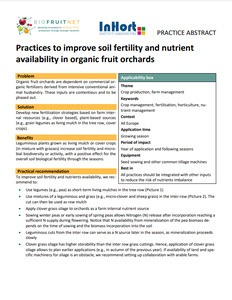{Tool} Practices to improve soil fertility and nutrient availability in organic fruit orchards (Biofruitnet Practice Abstract). Creator(s): Malusa, Eligio and Tartanus, Małgorzata. Issuing Organisation(s): IO-PIB - National Institute of Horticultural Research. Biofruitnet Practice Abstract, no. 055. (2022)
|
PDF
- Published Version
- English
(Practices to improve soil fertility and nutrient availability in organic fruit orchards)
340kB | |
![[thumbnail of 2022-07-01 14_27_03-Practices to improve soil fertility and nutrient availability in organic fruit o.png]](/44242/3.hassmallThumbnailVersion/2022-07-01%2014_27_03-Practices%20to%20improve%20soil%20fertility%20and%20nutrient%20availability%20in%20organic%20fruit%20o.png)  Preview |
Image (PNG)
- Cover Image
- English
97kB |
|
PDF
- Published Version
- Polish/Polski
(Praktyki poprawiające żyzność gleby i dostępność składników odżywczych w ekologicznych sadach owocowych)
347kB | |
|
PDF
- Published Version
- Latvian/Lettish/Latviesu
437kB |
Document available online at: https://orgprints.org/44242
Summary in the original language of the document
Leguminous plants grown as living mulch or cover crops (in mixture with grasses) increase soil fertility and microbial biodiversity or activity, with a positive effect for the overall soil biological fertility through the seasons.
Practical recommendation
To improve soil fertility and nutrients availability, we recommend to:
• Use legumes (e.g., pea) as short-term living mulches in the tree row
• Use mixtures of a leguminous and grass (e.g., micro-clover and sheep grass) in the inter-row. The cut can then be used as row mulch
• Apply clover grass silage to orchards as a farm internal nutrient source
• Sowing winter peas or early sowing of spring peas allows Nitrogen (N) release after incorporation reaching a sufficient N supply during flowering. Notice that N availability from mineralization of the pea biomass depends on the time of sowing and the biomass incorporation into the soil
• Leguminous cuts from the inter row can serve as a N source later in the season, as mineralization proceeds slowly
• Clover grass silage has higher storability than the inter row grass cuttings. Hence, application of clover grass silage allows to plan earlier applications (e.g., in autumn of the previous year). If availability of land and specific machinery for silage is an obstacle, we recommend setting up collaboration with arable farms.
| EPrint Type: | Practice tool |
|---|---|
| What problem does the tool address?: | Organic fruit orchards are dependent on commercial organic fertilizers derived from intensive conventional animal husbandry. These inputs are contentious and to be phased out. |
| What solution does the tool offer?: | Develop new fertilization strategies based on farm internal resources (e.g., clover based), plant-based sources (e.g., grain legumes as living mulch in the tree row, cover crops). |
| Country: | Poland |
| Type of Practice Tool: | Practice abstracts |
| Keywords: | Crop management, fertilisation, horticulture, nutrient management |
| Agrovoc keywords: | Language Value URI English crop production http://aims.fao.org/aos/agrovoc/c_5976 English fertilization http://aims.fao.org/aos/agrovoc/c_2863 English horticulture http://aims.fao.org/aos/agrovoc/c_3671 English nutrient management http://aims.fao.org/aos/agrovoc/c_330697 |
| Subjects: | Crop husbandry > Production systems > Fruit and berries |
| Research affiliation: | European Union > Horizon 2020 > Biofruitnet Poland European Union > Organic Farm Knowledge |
| Horizon Europe or H2020 Grant Agreement Number: | 862850 |
| Related Links: | https://organic-farmknowledge.org/tool/44242, https://biofruitnet.eu, https://twitter.com/farm_knowledge/status/1679037310409613312, https://www.facebook.com/organicfarmknowledge/posts/pfbid0hAxpav3pHrScdhLrxY3KA4hMw3waDLx3bqGBMF7tZZPtMQM14BeF42ChKaUbvJJjl |
| Project ID: | ofk |
| Deposited By: | Basler, Andreas |
| ID Code: | 44242 |
| Deposited On: | 29 Jun 2022 16:14 |
| Last Modified: | 02 May 2024 10:32 |
| Document Language: | English, Polish/Polski |
| Status: | Published |
Repository Staff Only: item control page

 Download Statistics
Download Statistics Download Statistics
Download Statistics
